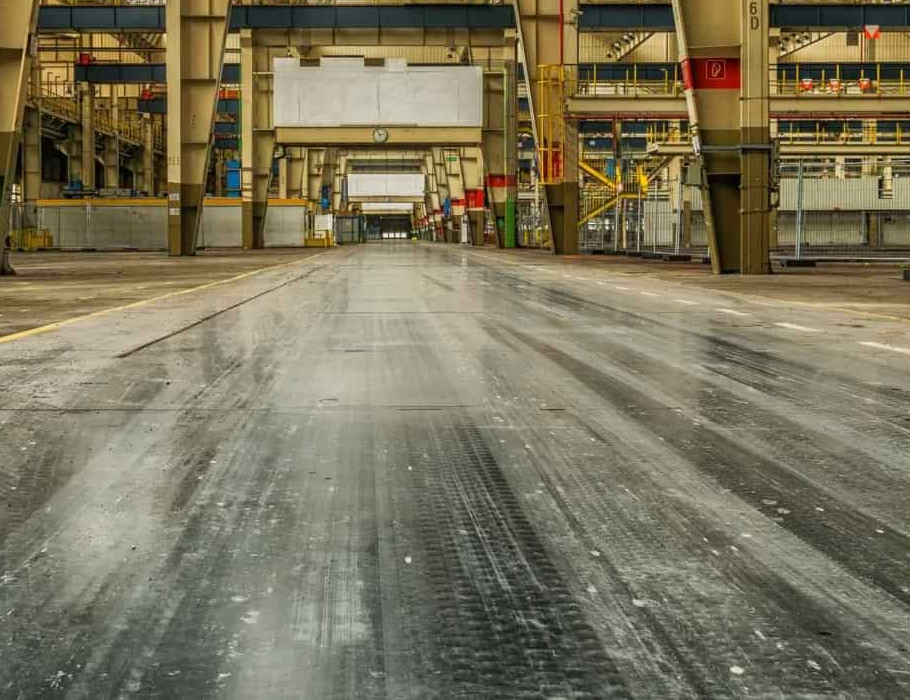Waterproofing Guide
Industrial buildings factories, warehouses, plants face extreme conditions like heavy machinery vibration, chemical exposure, and water stress. Without proper waterproofing, even small leaks can halt operations, cause structural damage, and lead to costly downtime. Here's a simple guide to safeguard industrial facilities:
1. Site Assessment
Begin with a detailed inspection. Check roofs, basements, external walls, expansion joints, water tanks, and chemical storage areas for cracks, seepage, or surface wear.
2. Surface Preparation
Clean the surfaces thoroughly. Remove grease, dust, chemicals, and loose materials. For industrial sites, mechanical methods like sandblasting or power washing may be required for best results.
3. Choose Heavy-Duty Waterproofing Systems
Industrial waterproofing demands high-performance materials that can withstand mechanical loads, chemical attacks, and thermal stresses. Choose from:
• PU (Polyurethane) liquid membranes for high flexibility
• Epoxy coatings for chemical resistance
• Bituminous membranes for large areas like factory roofs
• Cementitious coatings for water tanks, basements, and wet areas
4. Application with Precision
Apply the chosen system as per product specifications, ensuring proper thickness and layering. Reinforce critical joints, floor-wall junctions, and expansion joints with additional layers or reinforcing fabrics.
5. Protection Against Chemicals and Traffic
For areas exposed to chemical spillage or vehicular movement, use specialized protective coatings that resist abrasion and corrosion.
6. Drainage Planning
Ensure proper drainage systems are installed to quickly remove water and prevent standing water on roofs or floors, which could damage the waterproofing.
7. Maintenance and Monitoring
Regularly inspect the waterproofed areas for signs of damage, especially after heavy rains or chemical exposure. Early maintenance extends life and minimizes disruption.
✅ Pro Tip:
Protect your industrial assets with robust ADT Industrial Waterproofing Solutions — because when it comes to factories, downtime is more expensive than waterproofing!

Categories
INDUSTRIAL WATERPROOFING SOLUTIONS:
1. What is industrial waterproofing?
Industrial waterproofing is a specialized process that protects large-scale structures, such as factories, warehouses, bridges, and industrial plants, from water damage, leaks, and corrosion. It involves applying advanced coatings, membranes, and sealants to extend the durability of buildings and infrastructure.
2. Why is industrial waterproofing important?
Industrial structures are exposed to harsh environmental conditions, heavy machinery, and chemical exposure. Waterproofing helps in:
- Preventing structural deterioration
- Protecting equipment and stored materials
- Reducing maintenance costs
- Enhancing the lifespan of buildings and infrastructure
3. What types of industrial waterproofing solutions does ADT Industries Pvt. Ltd. offer?
We provide tailored waterproofing solutions for both old and new industrial constructions, including:
- Cementitious Waterproofing
-- Example: Fosroc Brushcrete – A flexible cement-based waterproofing system used for underground structures and water tanks.
-- Best for: Basements, tunnels, retaining walls. - Polyurethane (PU) Elastomeric Coatings
-- Example: Dr. Fixit Flexi PU 270(I) – High-performance PU coating with excellent crack-bridging ability.
-- Best for: Industrial rooftops, parking decks, bridges. - Liquid-Applied Waterproofing Membranes
-- Example: Sikalastic 450I – A single-component PU-based waterproofing system providing superior durability.
-- Best for: Exposed roofs, podium slabs, expansion joints. - Bituminous Waterproofing
-- Example: Fosroc Nitoproof 600PF – A high-performance bitumen-based coating for substructures.
-- Best for: Foundations, basements, underground tunnels. - HDPE & APP Membrane Waterproofing
-- Example: Dr. Fixit Prebond E/S/W – A high-quality HDPE membrane for heavy-duty industrial waterproofing.
-- Best for: Underground structures, tunnels, large industrial sheds.
4. How does industrial waterproofing differ for old and new constructions?
- New Construction: Waterproofing is integrated during construction, ensuring long-term durability. Products like Fosroc Conplast WL and Dr. Fixit Prebond E are commonly used.
- Old Construction: Requires repair-based solutions such as PU coatings and liquid-applied membranes to seal cracks, leaks, and deteriorating surfaces.
5. What are the common problems that industrial waterproofing addresses?
- Water seepage and leaks
- Cracks in walls and roofs
- Corrosion of reinforcement bars
- Efflorescence (white deposits on surfaces)
- Damage caused by chemical exposure
6. Can waterproofing withstand heavy machinery and industrial operations?
Yes, our high-performance coatings like Sikalastic 560 and Dr. Fixit Flexi PU 270(I) are designed to withstand mechanical stress, heavy loads, and industrial chemicals.
7. How long does industrial waterproofing last?
The durability depends on the method used:
- Liquid waterproofing membranes: 10-15 years
- PU coatings: 15-20 years
- Bituminous coatings: 10-12 years
- HDPE Membranes: 20+ years
Regular maintenance and inspections can further enhance longevity.
8. How much does industrial waterproofing cost?
The cost varies based on the area, type of waterproofing, and the condition of the structure. Contact us for a site inspection and customized quote.
9. How long does the waterproofing process take?
Depending on the project size and method used, waterproofing can take 3-10 days for application and curing.
10. Can waterproofing be applied over existing coatings?
Yes, we offer solutions like PU coatings and silicone-based sealants that can be applied over old coatings after proper surface preparation.
11. Does industrial waterproofing require special maintenance?
To maintain effectiveness:
- Conduct annual inspections for cracks or leaks.
- Clean drainage systems to prevent waterlogging.
- Reapply protective coatings if necessary.
12. Does ADT Industries Pvt. Ltd. provide a warranty on industrial waterproofing?
Yes, our solutions come with warranties based on the product and application method, ranging from 5 to 20 years.
13. How can I schedule an industrial waterproofing service?
You can contact ADT Industries Pvt. Ltd. through phone, email, or our website for a consultation and site inspection.